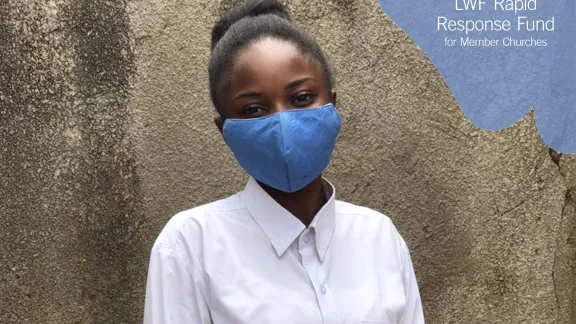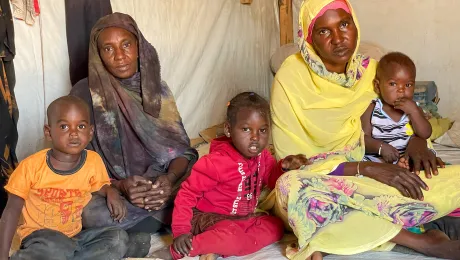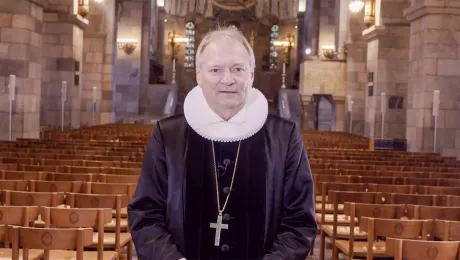
âWear a mask. Respect the regulations and restrictions. The disease is still out there.â This is Ms Sandrine Ilungaâs message to fellow youth, as DRC eases COVID-19 restrictions and her church, the Evangelical Lutheran Church in Congo, reaches out to students and their families. PHOTO: ELCCo
LWF Rapid Response Fund supports provision of face masks and sanitation items in schools
(LWI) – In mid-September, Sandrine Mumba Ilunga received the good news that she had passed her secondary school exams with distinction and would be eligible to join university and study medicine. She is not the only one. The entire sixth-form class of 47 girls and boys studying chemistry and biology at the Maadini Institute in Lubumbashi, Democratic Republic of Congo (DRC) qualified for the national certificate of secondary school education (Diplôme d’état).
Had one asked the 18-year-old what the future held six months ago, “I would have answered ‘nothing,’ because the dark cloud of the coronavirus disease [COVID-19] had obscured my dream of becoming a doctor,” she says.
Ilunga, an active youth member of the Evangelical Lutheran Church in Congo (ELCCo) is among millions of students in the DRC who resumed partial schooling in mid-August after the government lifted the lockdown it had imposed from 24 March until 21 July to slow down the COVID-19 pandemic.
Passing her exams is not the only thing for which Ilunga is grateful. “When we returned to school, I was excited to learn that a team from my church (ELCCo) was distributing protective cloth face masks to all the students and teachers, as well as sanitizing soap and washing basins to be used in the common areas.”

A team from ELCCo distributes hand-washing kits, soap and face masks at the Complex Scolaire Oasis mixed secondary school in Lubumbashi, DRC. Photo: ELCCo/ Banza Lupanga
Her school was among several others in Lubumbashi where ELCCo volunteers distributed over 5,200 washable facemasks. The Lutheran World Federation (LWF) member church also conducted awareness raising sessions to amplify the health authorities’ mandatory requirements of wearing protective facemasks, regular handwashing with soap, and maintaining a physical distance of at least 1 meter.
The ELCCo COVID-19 response initiative is supported by the LWF Rapid Response Fund (RRF), through which requesting churches received an amount of up to EUR 5,000 toward efforts aimed at reducing the impact of the novel coronavirus disease.
Mask wearing, a new habit
According to the World Health Organization, DRC had 10,840 COVID-19 cases and 276 deaths by 12 October. As authorities relax movement restriction measures, mask wearing in public places remains mandatory. “It has become a habit—at school, on the streets in the market—everybody wears masks. That is a good sign that we care about protecting ourselves and others,” Ilunga remarks.
It has become a habit—at school, on the streets in the market—everybody wears masks. That is a good sign that we care about protecting ourselves and others.
The DRC Lutheran church began its intervention during the lockdown itself and complied with the government safety directives. “Our church field officers visited neighborhoods, moving from door to door, conducting trainings and distributing protection masks, hydro-alcoholic soap and washing bowls to pupils in their families,” says ELCCo General Secretary Mr Gilbert Ilunga-Nkasa Talwa. “And, when the government decided to open school activities from 15 August for a limited number of pupils in the last cycle of the year, our project team deployed again,” he adds.
Addressing economic disparities
The long period of restrictions has been difficult for many people. “There was no church, no school, no meeting friends and extended family,” Ilunga recalls. During the four months at home, her parents organized tutoring sessions and she joined student discussion groups on mobile phone platforms to prepare for her exams. Still she, adds, “I kept wondering about families who were already struggling to get by, and about the street children who our church youth group used to visit. Would they get sick with the virus, who would check on them, were they safe, where would they get food in a locked city without passers-by offering them something?” she would often ask herself.

Sixth grade pupils in a classroom at the Jerusalem Lutheran School in Lubumbashi, wearing face masks provided by the ELCCo team in August. Photo: ELCCo/ Banza Lupanga
In fact, ELCCo witnessed how COVID-19 has aggravated the already existing economic disparities in the country of 89.5 million people, most of whom earn a living in the informal sectors. “During the project implementation, our teams encountered two challenges—a huge demand for protective materials for all family members and the high levels of poverty in most families,” general secretary Talwa says.
While the project targeted school-going children, the teams found out that most households do not have sufficient means and cannot afford to buy protective masks for each family member. Unable to meet such demands, the Lutheran church continues to encourage parents to sew washable protective masks using available local materials, as it seeks to cater for people in dire need.
‘The disease is still out there’
The ELCCo general secretary says he is grateful that the church’s intervention contributed to keeping people safe during the pandemic. “We are happy to notice that all students on the streets of Lubumbashi wear protective masks. However, the unexpectedly high number of people who still need masks amid high levels of poverty, is a concern that we must continue to address,” Talwa concludes.
As Lubumbashi gradually eases its lockdown measures and Sandrine Ilunga waits to receive replies to her university entry applications, she hopes her church youth group can meet again and check on the street children. Her message to fellow youth adjusting to a COVID-19 environment: “Wear a mask. Respect the regulations and restrictions. The disease is still out there.”
The Rapid Response Fund, launched in April, supports many of the communion’s member churches that are particularly vulnerable during the global health emergency. Upon approval of a project application, a church can receive a grant of up to EUR 5,000 from the global fund supported by LWF’s member church partners around the world.
The Evangelical Lutheran Church in Congo has nearly 113,000 members and it joined the LWF in 1986. It is led by Presiding Bishop René Mwamba Sumaili. The church’s diaconal work includes four Lutheran education institutions in Lubumbashi that cater to 6,122 learners at kindergarten, primary and secondary school levels.


